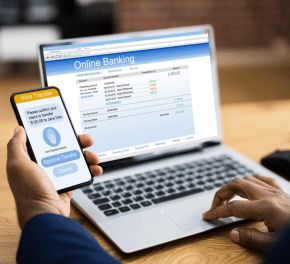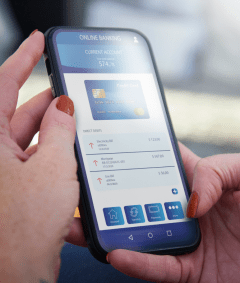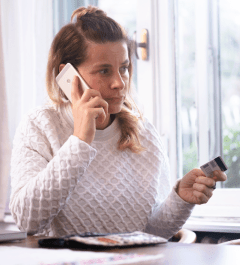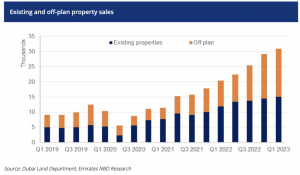The sad reality is that there are large number of scammers who are working hard to hack your accounts, obtain your information, and take your money. Far too many are successful but you can take some smart, and logical, steps to reduce your risk of falling prey to a scammer.
Fraudsters are organised and clever and will often choose their targets using information that you have posted or shared online. Some can even see spending habits so will target based on that. They can go to extraordinary lengths to try and convince you they are genuine so we all need to stay one step ahead.
 These days, our lives are online and, in our smartphones, so we need to take steps to protect ourselves.
These days, our lives are online and, in our smartphones, so we need to take steps to protect ourselves.
We need to take steps so we don’t become a victim.
In this article I want to give you some useful tips to keep your banking secure and on to avoid the most common financial scams.
General banking security tips
- Keep your password (PIN) secret.
- Log out properly from all banking and financial apps and websites after each session.
- Do not reply to any email that asks for your ID, password, PIN or account details
- No bank will ask for your password or PIN in an email. They will not ask you for a password or PIN during a telephone call.
- Do not follow any links in emails to reach online banking websites.
- Always enter the actual website address of your bank or other financial institution.
- A bank or credit card company employee will not call you from a mobile number.
- Do not lend a credit or debit card to anyone else.
- Do not login from a public terminal.
Internet security tips
- Never reply to unsolicited emails asking for your personal information.
- Check your bank statements regularly to identify any errors or fraudulent transactions.
- Never allow your browser to save your banking passwords.
- Keep your online banking logins and passwords safe. Don’t keep them in the same place as your card.
- Do not run any program files unless you trust the source.
- Always check that you are on an official website not just for banking but when purchasing any items or services online. Confirm that the site URL is correct and that there is a security certificate in the bottom-right corner of your browser.
- Install an anti-virus package and keep it updated.
- Control access to your computer, including the installation of applications.
- Think twice when sharing personal information. Once you have shared info online, it remains out there.
Software and patches
- Ensure that your operating system and browser patches are kept up to date.
- Install and update your anti-virus and personal firewall software.
WhatsApps, SMSs and emails
 Some scammers try “phishing” (also called “smishing if an SMS) in an email or WhatsApp message. This is when they send out a fake message pretending to be from a financial institution, or even a delivery or postal service.
Some scammers try “phishing” (also called “smishing if an SMS) in an email or WhatsApp message. This is when they send out a fake message pretending to be from a financial institution, or even a delivery or postal service.
These messages try and get you to click on a link, or send information to a fake email address or phone number. If you look closely, you will see that it is not a genuine email address. There will often be grammar and spelling errors.
If an email address has been hacked, a message could even be linked to earlier, genuine, emails.
Never reply to these fake messages. Report them and delete.
Beware the bank transfer scam
This normally takes the form of an unexpected telephone call from someone claiming to be from your bank or even the police. In the UAE, they often claim to be from CID or the Central.
 The caller will try and get you to share personal information to access your bank account.
The caller will try and get you to share personal information to access your bank account.
They may have some personal information to try to get your trust and will often ask for an OTP (one time password) that they have made your bank send. Never share that.
They may also claim that your account is being hacked and that you need to move money to another account to keep it safe.
If the call is unexpected, you can terminate and call the bank back using the number that you know to be correct.
Other tips
- No regulated financial company will ask you for information or money over Telegram, the messaging service.
- Always enable two-factor identification.
- Don’t “click through” to a link from an unsolicited or unknown sender. Open a new browser page to access a website, or send a fresh email to the sender to check authenticity.
- When purchasing anything online, check that the company is genuine.
- Don’t let your card out of your sight when making a payment.
- Beware of “boiler room” scams where you are contacted by someone about a financial opportunity that sounds too good to miss and where you are asked to transfer money immediately. Genuine advisers go through proper processes before any money is ever paid.
- Notify your bank if you are going to use a credit/debit card when travelling out of the country.
What to do if you are scammed or hacked
 Contact your bank immediately to notify them of any concerns and to block and cancel cards.
Contact your bank immediately to notify them of any concerns and to block and cancel cards.
Most UAE banks are quick to provide a replacement card.
If money is taken fraudulently, you will need to go through a process with your bank to try and recover it. It could take a few weeks.
Fraudsters and scammers can be reported to the police.
Cybercrimes in the UAE can be reported online through the following channels:
Stay smart, stay alert, and stay safe.
I have been writing about legal, banking, financial and consumer issues in the UAE media since November 2008, mainly throuigh a reguilar clumn in The National newspaper. This is in addition to being a practising independent financial adviser, offering comprehensive financial advice to residents across the UAE and the wider GCC.
To arrange a discussion about any aspect of your personal financial planning, please email me at keren@holbornassets.com
Expert, qualified, professional advice on a range of issues including general financial planning, life and critical illness cover, investments and UK pensions, wills and inheritance tax planning, UK tax, offshore banking, citizenship programmes, currency transfers and more.
I write articles such as this one as part of the holistic personal financial planning service and that I provide to expats, and the general consumer, financial and legal information that I provide in The National newspaper, other media, and on the Facebook group British Expats Dubai.
Please take a look at the other useful articles on this website.
Currency transfers. Best rates and fully secure
Areas of advice. How can I assist?
Living in the UAE. 10 major money mistakes you want to avoid.
NOTE. All information on this website is mine and must not be copied or reused without permission. ©Keren Bobker



